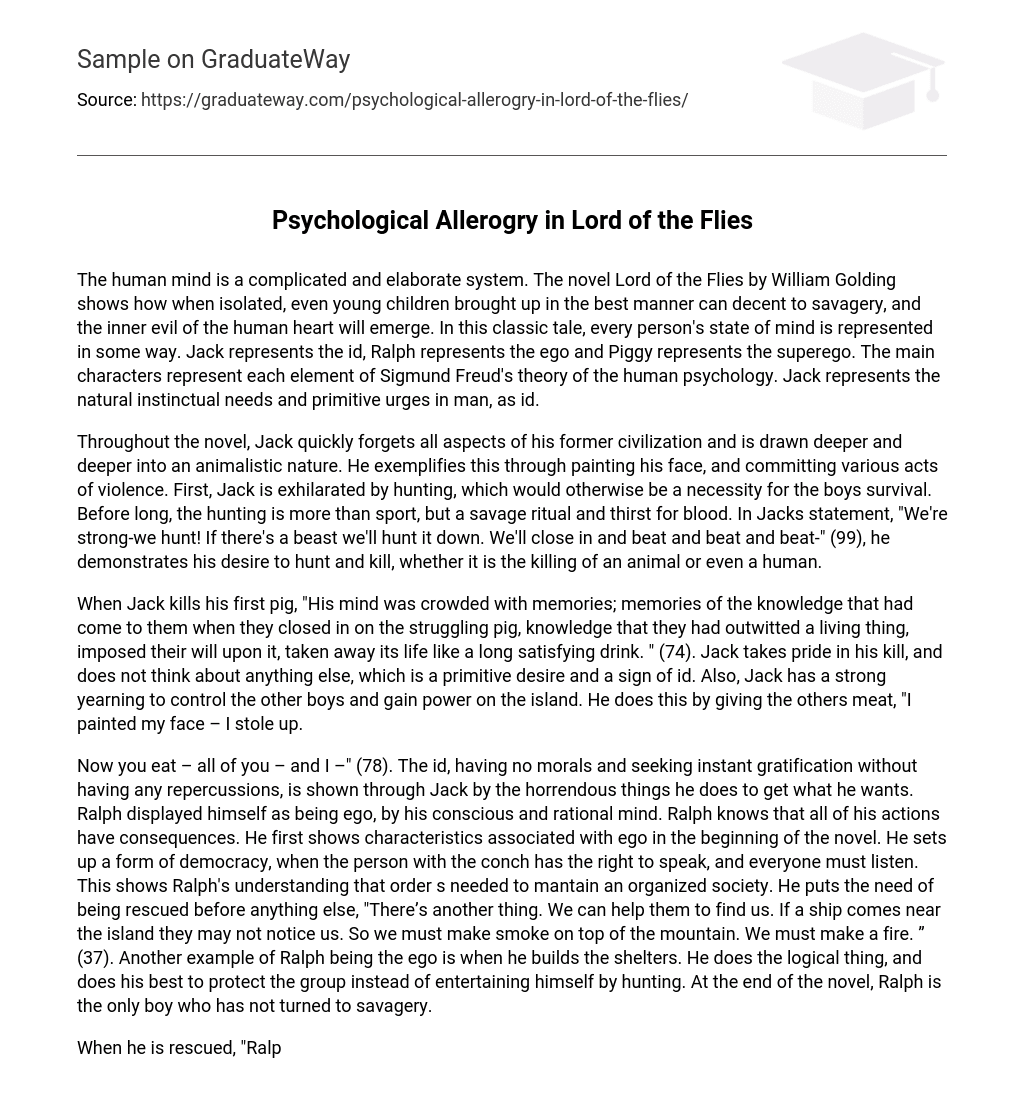The human mind is a complicated and elaborate system. The novel Lord of the Flies by William Golding shows how when isolated, even young children brought up in the best manner can decent to savagery, and the inner evil of the human heart will emerge. In this classic tale, every person’s state of mind is represented in some way. Jack represents the id, Ralph represents the ego and Piggy represents the superego. The main characters represent each element of Sigmund Freud’s theory of the human psychology. Jack represents the natural instinctual needs and primitive urges in man, as id.
Throughout the novel, Jack quickly forgets all aspects of his former civilization and is drawn deeper and deeper into an animalistic nature. He exemplifies this through painting his face, and committing various acts of violence. First, Jack is exhilarated by hunting, which would otherwise be a necessity for the boys survival. Before long, the hunting is more than sport, but a savage ritual and thirst for blood. In Jacks statement, “We’re strong-we hunt! If there’s a beast we’ll hunt it down. We’ll close in and beat and beat and beat-” (99), he demonstrates his desire to hunt and kill, whether it is the killing of an animal or even a human.
When Jack kills his first pig, “His mind was crowded with memories; memories of the knowledge that had come to them when they closed in on the struggling pig, knowledge that they had outwitted a living thing, imposed their will upon it, taken away its life like a long satisfying drink. ” (74). Jack takes pride in his kill, and does not think about anything else, which is a primitive desire and a sign of id. Also, Jack has a strong yearning to control the other boys and gain power on the island. He does this by giving the others meat, “I painted my face – I stole up.
Now you eat – all of you – and I –” (78). The id, having no morals and seeking instant gratification without having any repercussions, is shown through Jack by the horrendous things he does to get what he wants. Ralph displayed himself as being ego, by his conscious and rational mind. Ralph knows that all of his actions have consequences. He first shows characteristics associated with ego in the beginning of the novel. He sets up a form of democracy, when the person with the conch has the right to speak, and everyone must listen. This shows Ralph’s understanding that order s needed to mantain an organized society. He puts the need of being rescued before anything else, “There’s another thing. We can help them to find us. If a ship comes near the island they may not notice us. So we must make smoke on top of the mountain. We must make a fire. ” (37). Another example of Ralph being the ego is when he builds the shelters. He does the logical thing, and does his best to protect the group instead of entertaining himself by hunting. At the end of the novel, Ralph is the only boy who has not turned to savagery.
When he is rescued, “Ralph wept for the end of innocence, the darkness of man’s heart, and the fall through the air of a true, wise friend called Piggy. ” (225). Ralph learns that evil resides within all humans, even young boys. This shows that Ralph has a higher mental process of reasoning. Ralph clearly represents ego, he has a mind that is always rooted in reality. The superego, influenced by social morals, rules, and values is represented by Piggy. Piggy has a need for rules and is constantly referring to civilization to create order among the boys.
Without this order, Piggy knows that there will be no hope for him and the others to be rescued. He proved this need for rules when he takes names, “Piggy moved among the crowd, asking names and frowning to remember them. ” (17). The superego strives to act in a socially appropriate manner. Piggy shows this by always referring to the adult world, “Aren’t there any grown-ups at all? ” (2). Although Piggy is one of the most intelligent boys on the island, he worries often and shows just how dependent he is on others for guidance.
By being kind, trying to create order, and following rules, Piggy represents the superego. Throughout the novel, William Golding represents the concept of Sigmund Freud’s theory of psychology through the conflicting personalities of the key characters. Jack, through his instinctive drive towards power, is the id. The ego is seen in Ralph, due to his ability to reason and calculate. Piggy is superego, because of his social values and need for rules. Overall each of these characters truly symbolizes a part of Freud’s theory of the human psyche.





